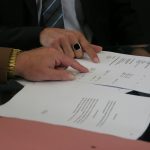If it moves, add VAT??? It must have been over 20 years ago when an accountant told me that his normal approach to things was that “If it moves, add VAT”. At the time, it sort of made sense. VAT officers weren’t particularly alert to dealing with overcharged VAT in those days and rarely queried VAT charged incorrectly if the recipient was fully taxable and could claim all of the VAT on expenditure.
Nowadays VAT officers are much more knowledgeable about the technical side of VAT and are much more likely to assess businesses who claim VAT on expenditure as input tax when it has been incorrectly charged by their suppliers.
And while accountants are usually very good when dealing with VAT liability, I still get a lot of queries, particularly from accountants working in industry, about VAT on non-core business activities, especially transactions with related businesses.
The extension of the “if it moves, add VAT” approach is that if you charge VAT on income, the assumption is that you can claim VAT on related costs. Which is why I’m often asked if it’s okay to claim VAT on expenditure if you charge an associated business for services and charge VAT on the income.
Unfortunately this over-simplifies the situation because the rules about claiming VAT on costs are much more complicated than they look. To begin with, if you’ve charged VAT incorrectly on an invoice to a customer, you still have to declare the VAT on your VAT return. And the customer is left high and dry because you can’t claim VAT that has been incorrectly charged, regardless of your VAT recovery status or whether the supplier has paid the VAT charged to HMRC.
Of course if you’ve charged or claimed VAT incorrectly, you can correct the errors under the 4 year adjustment procedure, explained in VAT Notice 700/45. But it can often be a messy, time-consuming business and could lead to penalties or interest or more complex and distressing hassle if HMRC discover the errors.
And what about other situations where charging VAT incorrectly creates problems?
Here are just a few:
• You might assume that adding VAT to exempt property rental would mean that you can claim VAT on costs, but it could be regarded by HMRC as a de facto option to tax, meaning that you have to add VAT to all rental and sales income from the property concerned. If you’ve charged VAT incorrectly on such income, then it may not be a simple case of issuing a credit note to the tenant/purchaser.
• Adding VAT to property costs increases the stamp duty land tax cost because SDLT is calculated by reference to the VAT inclusive cost.
• You can’t claim VAT on margin scheme supplies, including certain travel and accommodation or certain sales of second hand goods.
• You can’t claim VAT if you’ve purchased a business as a going concern.
And of course any partly exempt business has to factor in the additional cost of irrecoverable VAT even if it’s charged correctly, so you don’t want to make things worse by charging VAT when it’s not necessary.
HMRC have always said that business owners are free to organize their affairs to minimize their VAT costs. For example connected limited companies can register in VAT groups and don’t charge VAT on transactions with other members of the group. That is regarded as a “normal consequence of VAT grouping”.
But if you set up arrangements that aren’t genuine commercial arrangements and obtain a VAT benefit, including saving, minimizing or deferring VAT (whether or not that’s the intention of the arrangements), HMRC can and will examine the arrangements in detail. Even if you set up contracts or inter-company agreements for services, HMRC may decide that the contracts don’t represent the true arrangements and assess for VAT on the basis that the contracts don’t exist. They may also withdraw the use of monthly returns or cashflow accounting or other helpful VAT accounting facilities and this can cause real problems. You don’t want to be in a situation where HMRC’s refusal to pay a claim for VAT on services from an associated business is the primary cause of your business becoming insolvent.
So when DO you charge VAT?
The answer to “when do you charge VAT” is deceptively simple. The principle is that you charge VAT on consideration for a taxable supply of goods or services made in the course or furtherance of a business.
Selling goods is usually very obvious – title to the goods passes from you to the person who paid you for them.
What’s complicated is establishing whether you’ve made a supply of services.
Services are often intangible and it’s not always possible to demonstrate that services have been carried out. And it becomes even more difficult when we’re dealing with services between associated businesses because very often the arrangements are informal or there’s no written agreement or the agreement doesn’t reflect the actual practices.
This is one of the main subjects discussed in my new ebook VAT on inter-company services, management charges, cost sharing and much more…. It explains how to establish whether services have been carried out, whether payment is “consideration” for those services, the VAT liability of the services and how to decide whether you can claim VAT on related costs.
The book helps you to work out the correct VAT liability on transactions with associated businesses, which means that you can spend more time on your main business activities.
Marie
10 June, 2015
